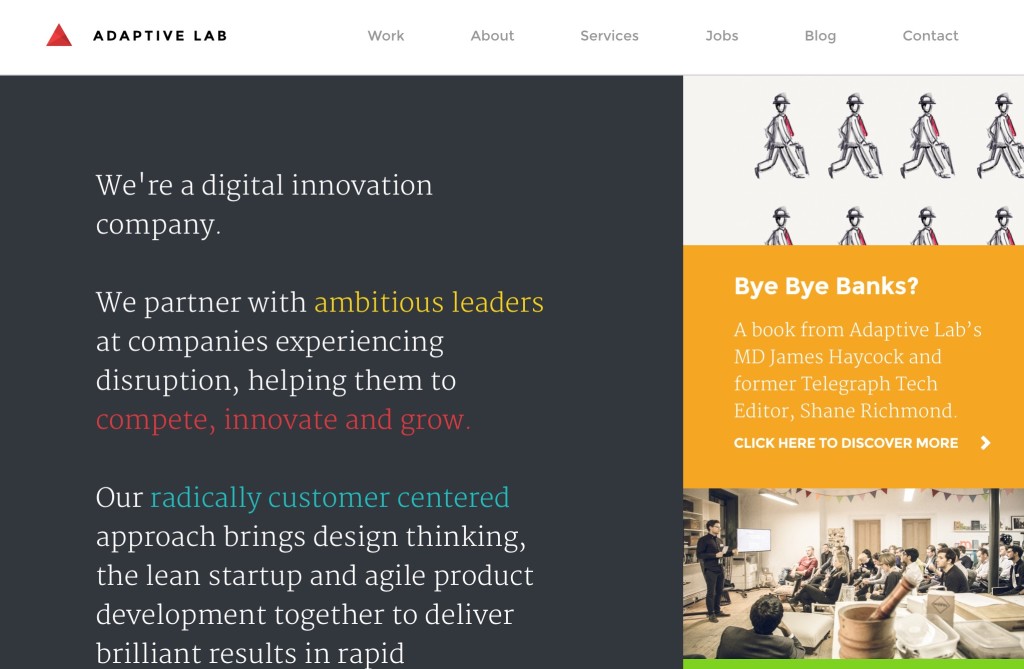James Haycock of Adaptive Lab

For today’s profile we have the Managing Director of Adaptive Lab, James Haycock.
Adaptive Lab is a digital innovation agency. The company partners with ambitious leaders at companies experiencing disruption, helping them to compete, innovate and grow. Adaptive Lab’s radically customer-centered approach brings design thinking, the lean startup, and agile product development together to deliver brilliant results in rapid timeframes. Adaptive Lab has worked with a range of brilliant companies, from early-stage start-ups to well-known PLCs, including Barclays, Experian, the Associated Press, 3 Mobile and ASOS. Additonally, Adaptive Lab recently undertook a research into the banking apps of 5 of the leading UK banks.
Let’s get cracking with today’s profile. Our questions are in bold.
—–
Who are you and what’s your background?
My name is James Haycock, and I run a business called Adaptive Lab. We’re a digital product and service design company.
Before Adaptive Lab I was working for a company that helped a whole range of businesses from early stage startups to the NHS, 10 Downing Street and ITV, to build social applications for both the complete social networks and apps on Facebook and Twitter.
Before that I was working as a consultant helping a series of startups to find their digital and product strategy, to build out teams and occasionally raise money.
And prior to that I was at a startup that helped connect university students before they went to Uni. But unfortunately it got trampled by facebook because they had a little bit more momentum than us in the UK. But we learnt a huge amount from that process.

I guess you could say that I’m a product person really. So whether it’s consulting with our clients as I am currently doing, or what I was doing previously, it’s mainly about helping them to understand who their target audience is and defining the problem that we’re trying to solve, how we can solve it by using technology and how we do so to create business value whether that be revenue, engagement, or whatever that metric might be.
What is your job title and what are your general responsibilities?
My job title is managing director. I have a broad set of responsibilities and as the company grows it changes and becomes more focused. The thing I spend a lot of my time on is building the profile and awareness of the company, developing relationships both from a future and current client point of view, but also from a team point of view, as well as the management of the company.
Can you give us an overview of your business?
We’re digital product specialists. We partner with leaders of world class companies to help them do two things:
(1) transform an existing business and
(2) help them to build or develop their business of the future.
We have a really strong point of view that the landscape now is moving faster than ever before and that it’s driven by consumers that do things differently, existing shifts in the technological landscape and a massive change in the competitor landscape. Within that world there are a couple of simple things that stand out or are true; which is that speed is the new competitive advantage, and experience is the differentiator, and we’ve built our whole company around that. We work with PLC’s, as well as businesses that people haven’t yet heard of.
Adaptive Lab is made up of strategists, designers and developers. We rapidly develop new concepts and propositions and turn those into prototypes. We constantly validate with the end customer and often use agile and lean techniques to carry out client projects.
Tell us how you are funded.
Adaptive Lab is self-funded / organically funded through sales so we haven’t had to take any venture capital.
Why did you start the company? To solve what problems?
We started the company because we thought that there was a big shift coming on. here were dinosaurs or giants that were struggling to maintain growth, or being toppled by bedroom entrepreneurs. People that are under 30 years old, even sometimes under 20 years old, have from their bedroom or garage created businesses of a phenomenal scale really quickly.
Uber has been valued at $40million dollars and didn’t exist 5 years ago. AirBNB, Facebook, Whatsapp are all phenomenal businesses. With all this change happening we didn’t see a business that could be a true partner of a leader. There wasn’t a company that was acting as partner with a startup mentality to businesses struggling to adapt to change. When we approach a PLC or a corporate they hire us because we look more like the business that will disrupt, rather than look like them. We may look, think and act differently, but we combine that with execution and delivery in ultimately solving the end customers problems and we do that by using agile and lean techniques.

Who are your target customers? What’s your revenue model?
Our target customers are people that are driving growth at established companies, owners and CEOs of smaller companies. It’s people we often just call entrepreneurs even if they’re inside a company, we call them corporate entrepreneur or intrapreneurs.
Our revenue model is consulting so we get paid on project / programme fees. Quite simple really.
If you had a magic wand, what one thing would you change in the banking and/or FinTech sector?
So there’s a bunch of different elements. I think from the end users point of view the experience is still lacking. Adaptive Lab recently carried out a mobile banking customer experience study, which looked at the 5 leading banking apps in the UK. These apps are not bad, but they’re still not what they could be, and they’re the ones at the front of the pack. There exists many people out there who have had experiences that are just not fantastic. If you try and apply for a financial services’ product these days it’s still a lot of paper. People’s expectations are completely different now so I think one thing I’d change is the experience that is offered to the end customer. I think for existing players to survive this period of disruption they need to rethink how they organise themselves from a cultural operations point of view.
I think there’s some big problems around legacy architectures technology, it’s really hard to do things quickly. A little niggly thing that I find annoying is when you have to get a pin security device to manage your accounts online.
What is your message for the larger players in the Finance industry?
I think there are two important elements they need to consider:
Firstly, they need to let their customer into their business and secondly, organise around that customer to be people rather than product focused. You have people who are focused on revenue or business line and product, but you don’t have people who are focussed around maximising customer value.
To be people rather than product focused you need to optimise how you do delivery, and ask themselves questions such as ‘How do you develop new products cheaper, or test new products cheaply? How do you reduce the cost of your experiment lifecycle so that you can try new things and be more experimental?’
This could be achieved by building APIs and sandboxes and testing grounds for you to try and test new things more easily.
What phone are you carrying and why?
I’m carrying the iPhone 6 because it’s a beautifully packaged piece of hardware and software that easily integrates with my laptop.
Where do you get your industry news from?
I read the business and technology sections of all the papers. Harvard Business Review, Finnovate, Digital Banking Club. I get a lot of information from channels like Twitter. Adaptive Lab also has a brilliant newsletter called Wunderkammer, which the team curates fortnightly so I gain also information from that. Also Fraggl which is a collaborative newsletter between Adaptive Lab and Neil Perkin of Only Dead Fish, is a service that delivers 10 of the best links from the Internet using a combination of expert, social and algorithmic inputs daily.
Can you list people you rate from the FinTech sector that we should be following on Twitter?
Dave Birch – should be followed on Twitter
Jason Bates over at Starling has done some really interesting things- a digital challenger bank there.
What’s the best FinTech product or service you’ve seen recently?
I think Betterment and Nutmeg are really interesting. I think they’re brilliantly designed. They’re opening up tools that are not otherwise available to the average investors. They’re trying to hold your hand and guide you on a customer journey in a completely different way.
Finally, let’s talk predictions. What trends do you think are going to define the next few years in the FinTech sector?
I think there will be a second wave of PFMs which isn’t really about charts, but is more about life stages and goals. Not so much about granular and how it sits, but more about helping people to understand if they’re going to be up or down by the end of the month and do some smart things about helping people save.
A new wave of PFM’s will open up infrastructures and services via APIs which has happened in lots of other sectors already. They will stimulate a growth of new businesses. I think it depends how long the next few years is but I think block chain has a pretty fundamental impact on the fintech sector. Fundamentally there will be a whole new set of rails that businesses can operate on and costs will come crashing down. So there will be lots of new areas to explore.
I think the banks will start to become very inquisitive because they will struggle to do innovation themselves and will invest in startups at a far higher rate.
—–
Thanks to James for his answers today. Find out more about Adaptive Lab on their website, twitter and YouTube.
Just to mention that Adaptive Lab recently undertook a research into the banking apps of 5 of the leading UK banks – To download a summary of the report for free visit here.
James will be launching his book ‘Bye Bye Banks’ in the next few months.
If you’ve any suggestions for other hot FinTech companies (startup, or established ventures) that we should be profiling, I’m all ears. Don’t hesitate to drop me a note at ewan@fintechprofile.com. There’s more information on this page.





